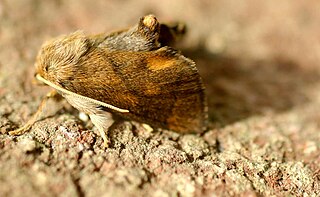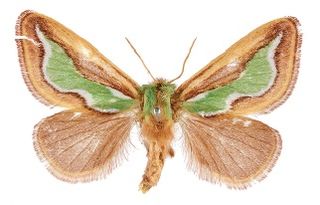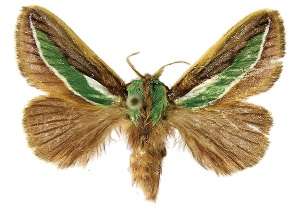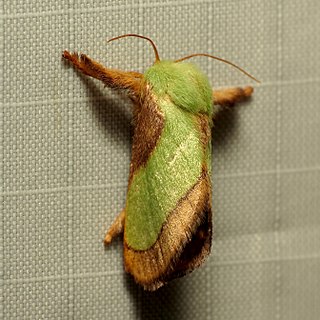Neaera, Neæra, or Neaira are different transliterations of an Ancient Greek name Νέαιρα. They may refer to:

The Limacodidae or Eucleidae are a family of moths in the superfamily Zygaenoidea or the Cossoidea; the placement is in dispute. They are often called slug moths because their caterpillars bear a distinct resemblance to slugs. They are also called cup moths because of the shape of their cocoons.

Parasa is a genus of moths of the family Limacodidae. It was described by Frederic Moore in 1860.

Parasa lepida, the nettle caterpillar or blue-striped nettle grub, is a moth of the family Limacodidae that was described by Pieter Cramer in 1799. It is a native minor pest found in the Indo-Malayan region, including India, Sri Lanka, Vietnam, Malaysia and Indonesia. It is an introduced pest to urban trees in western Japan.

Stigmella tiliae is a moth of the family Nepticulidae. It is found in all of Europe, except the Balkan Peninsula and the Mediterranean Islands.

Parasa indetermina, the stinging rose moth, is a moth of the family Limacodidae. It is found in the United States from New York to Florida, west to Missouri, Texas, and Oklahoma.

Parasa darma is a moth of the family Limacodidae. It is found in Burma, Sundaland, Palawan and Taiwan.

Parasa shirakii is a moth of the family Limacodidae. It is found in Taiwan.

Parasa viridiflamma is a moth of the family Limacodidae. It is found in Taiwan. The habitat consists of mid-elevation mountain areas.

Parasa pygmy is a moth of the family Limacodidae. It is found in Taiwan, inhabiting mountains, at altitudes ranging from 2,000 to 3,000 meters.

Parasa undulata is a moth of the family Limacodidae. It is found in China.

Parasa minwangi is a moth of the family Limacodidae. It is found in the Nanling Mountains of southern China. The habitat consists of mid-elevation mountain areas.

Parasa martini is a moth of the family Limacodidae. It is found in Taiwan. The habitat consists of mid-elevation mountain areas with primary vegetation.

Parasa consocia is a moth of the family Limacodidae. It is found in the Russian Far East, China and Taiwan.

Parasa chloris, the smaller parasa, is a species of slug caterpillar moth in the family Limacodidae.

Parasa bicolor, the green rice moth, is a moth of the family Limacodidae. The species was first described by Francis Walker in 1855. It is found in Sri Lanka, India, Nepal, Pakistan, Myanmar, Laos, Taiwan, Vietnam, Malaysia, Java, China and Taiwan.
Parasa hampsoni is a moth of the family Limacodidae first described by Harrison Gray Dyar Jr. in 1894. It is found in Sri Lanka.
Parasa similis is a moth of the family Limacodidae first described by Felder in 1874. It is found in Sri Lanka.













